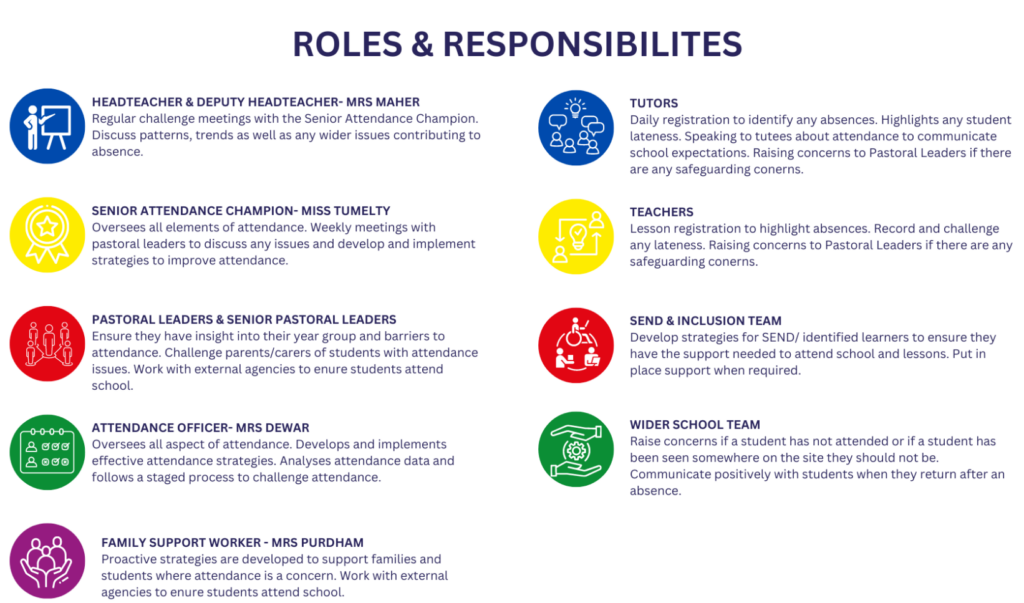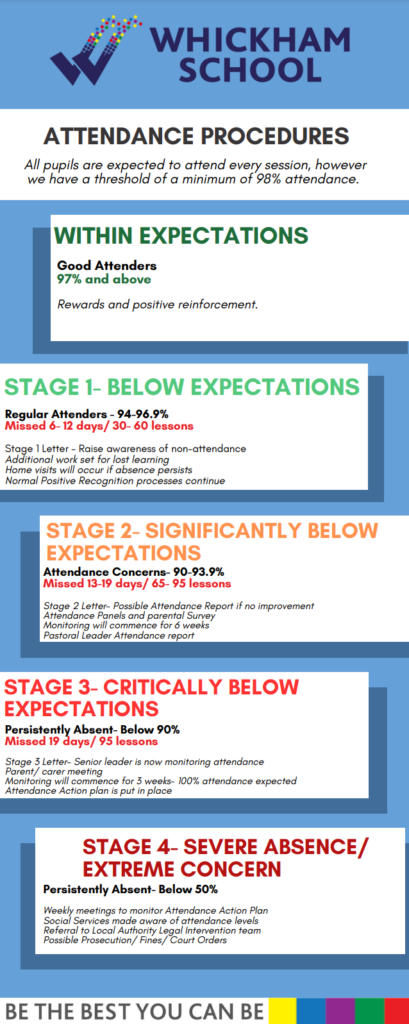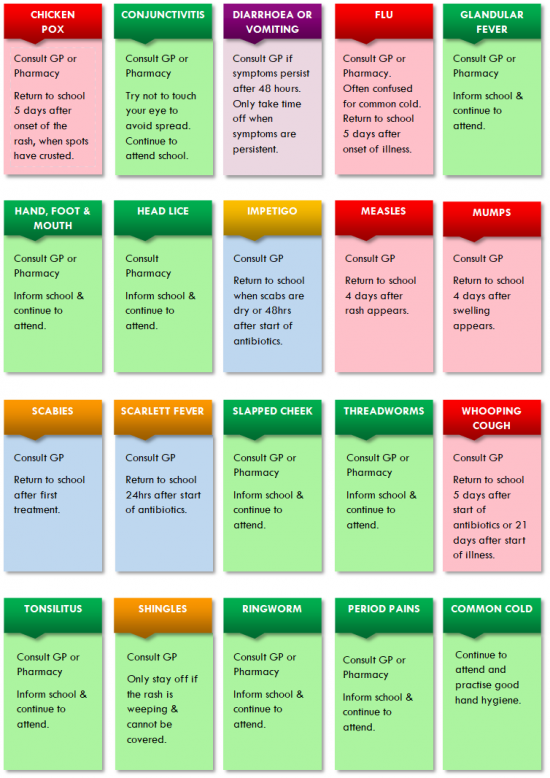Attendance

Whickham School offers an exceptional learning environment where pupils are happy and want to attend. Attendance is one of the most important elements in what makes a successful pupil. We actively celebrate excellent attendance with termly prizes and annual certificates. At Whickham School we have a culture of strong attendance and all staff play a key role alongside parents/ carers in ensuring students attend.
Whickham pupils should be proud of their achievements and understand the significance attendance has on their further education and future employment choices. However the real prize is the impact it has on their GCSE results clearly illustrated below:
Chances of Success at GCSE
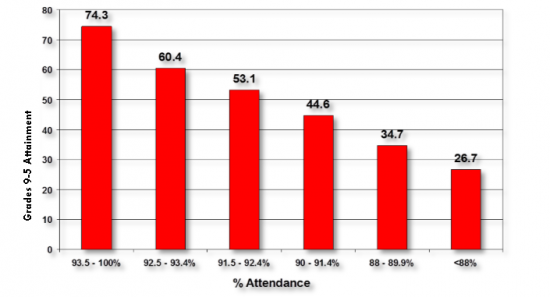
New Attendance Legislation
The DfE now receives daily school attendance data and analyses this to identify patterns and trends. If any child fails to attend school in the first 30 minutes of the school day they will receive a U code meaning they will receive an unauthorised AM registration mark, therefore attending on time is vital.
In addition, new legislation came into force on 19th August 2024 regarding the criteria and the issue of penalty notices to address school attendance. These changes will commence in Gateshead in September 2024.
The following changes have been made:
- The number of unauthorised absences to 10 unauthorised absences (5 days) in the most recent 10 school week period.
- The number of penalty notices that can be issued to a parent in respect of the same individual child to 2 within a 3-year period increases the amount of the penalty notice from £120 to £160 (if paid within 28 days) and £60 to £80 (if paid within 21 days) for the first penalty notice issued to a parent in respect of the same individual child in a 3-year period.
- It sets the amount of any second penalty notice issued to the same parent in respect of the same individual child within 3 years of the date the first penalty notice was issued to £160 to be paid within 28 days. No discount is offered.
- Further absences will proceed for prosecution in the Magistrate Court for the same parent in respect of the same child within 3 years of the date of the first penalty was issued.
Further information can be found on the Gov.uk website
Attendance Systems
As a school we analyse attendance data daily. When a child’s attendance falls below the expected levels, we make calls home, invite parents / carers in for meetings and conduct home visits. We want to work with you to help you to fulfil your obligation as a parent to ensure your child attends school. We also see how important it is to reward and praise pupils for strong attendance. We have designed rewards to promote excellent attendance as well as those whose attendance shows significant improvement.
Punctuality
Early is on time, on time is late, and late is unacceptable. Punctuality is an essential life skill which transfers into adulthood. We expect our pupils to be in school on time, every day.
The first bell rings at 08:30 allowing 5 minute movement time before pupils should be at their classrooms and ready to take their seats at 08:35. It is expected that all pupils are inside the school gates before 08:30. Arriving late results in lost learning.
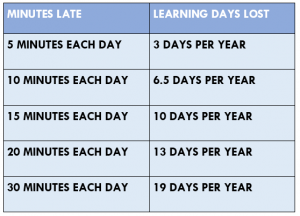
Pupils arriving late twice in any one will will be required to stay for a BIS Twilight detention on the following Monday Evening until 5pm.
Please encourage your child to get a good night’s sleep and take responsibility for setting their own alarm.
Whickham is a busy area, so please factor in the traffic. It’s better to be early than late.
If punctuality continues to be a problem, we will contact you to make an appointment to discuss your child’s timekeeping. Persistent lateness can lead to unauthorised marks which will contribute to legal intervention.
Medical Appointments
Wherever possible, all non-emergency appointments should be made out of school hours. Where appointments are made during school hours, there is an expectation that your child attends school before and after the appointment to minimise lost learning. All appointments must be substantiated by evidence, without which we are unable to authorise the absence. Examples of accepted evidence include:
- Doctor’s notes,
- prescriptions,
- labels from prescribed medication obtained during the period of absence,
- appointment letters/cards
- referral letters.
The following guide illustrates common illnesses and the anticipated impact they may have on your child’s attendance:
Reporting an Absence
If your child is sick, you have a legal requirement to inform school on each day of absence. Please call the school’s absence line on 0191 496 0026 by 9am on every day of the absence to speak to a member of staff or leave a message clearly stating the reason for absence.
You can also report your child absent using ClassCharts. Under the announcements tab, you will find a link to a Google form where you can add any supporting medical evidence to authorise the absence.
Just reporting that your child as ‘poorly’ or ‘under the weather’ is not enough, please let us know the reason/condition that is preventing school attendance.
If you fail to inform the school, we are legally required to make contact with you or any other named contact. Prolonged periods of absence could result in the school contacting the police.
Home Visits
Home visits can be made to check on the wellbeing of a pupil for one of the following reasons:
- No contact for the absence of a pupil
- School refusal
- Poor Attendance
- Long term illness support
- Safeguarding concerns
Home visits are part of our continued support of pupils and their families.
Leave of Absence
Please see our Leave of Absence Page for further information on how to request an authorised absence.
Legal Intervention
As a school we are required to follow legal processes and have statutory duties and expectations from the Local Authority. Legal proceedings can continue across academic years, so if attendance is poor and unauthorised at the end of the year, monitoring and referrals will continue into the new academic year in September.
We work very hard with our pupils and families to avoid legal proceedings and communication is the key to a successful relationship with school.
Leave of Absence
Please see our Leave of Absence Page for further information on how to request an authorised absence.
Frequently Asked Questions
Q: My child is just having an ‘off day’ so I’m not sending him/her in’
A: Having sporadic days off school can quickly add up. We always want to encourage pupils to attend, sometimes getting out of bed, showering and putting on a uniform is all it takes to feel a little better. Coming to school on days when you don’t really feel like it can make a big difference. We will always send pupils home if they are genuinely unwell.
Q: My child was sick over the weekend, should I keep him/her at home?
A: We don’t have a fixed 48hr rule for diarrhoea & sickness. If your child has had an isolated incident and is feeling better, please send them to school.
Q: I have received an attendance letter and I do not like the tone.
A: We’re sorry you feel that way but we have to state facts and legal information to make things clear . Each correspondence forms part of a possible legal intervention and must leave no ambiguity.
Q: I can’t provide medical evidence because it’s impossible to get a GP appointment.
A: Wherever possible, we will request medical evidence. If your child is off for 4 consecutive days, we will expect a GP visit. If your child has had several shorter absences for the same condition, we will also expect a GP visit. Medical evidence makes the difference between authorised absence and unauthorised absence. We do not pursue legal intervention where medical evidence is provided. It’s as important for you as it is for us.
Q: I do not like being challenged regarding my child’s absences and reserve the right to make the decision as to whether my child is well enough to attend school.
A: We are sorry you feel that way but please bear in mind that our team are simply doing their jobs in complying with school rules and statutory guidance. It’s not personal and ultimately we can offer a multitude of support to help your child’s attendance improve and safeguard their future success. Remember, we care.
Q: Why do I have to tell you the details when my child is unwell?
A: Firstly, your conversation with us is confidential. We do not share details with the wider school community but will need to know exactly what’s wrong so that we can offer the right level of support and guidance. We care for every aspect of your child’s health and wellbeing from migraines to mental health. Good communication will help us to help you.
Q: Why do I need to call school every day when my child is absent?
A: Put simply, we have a duty of care and cannot assume that your child is at home. A daily call to us will give both school and home the confidence of knowing that your child is safe.
Q: I cannot take your calls or make meetings due to work commitments.
A: We will endeavour to work around your schedule in the interest of your child. Conversations and face to face meetings are important in building relationships. Family dynamics are unique and so are the interventions we can put in place to help your child to overcome barriers to attendance.
Q: My child is anxious and their attendance has dropped, but you want to meet me to discuss this matter. You know why they can’t attend, what is the point of this meeting?
A: Our meetings are intended to be supportive. We have a team mental health first aiders in school along with a dedicated counsellor. If you are seeking external help it’s important to send in your appointment letters and stay in touch.

